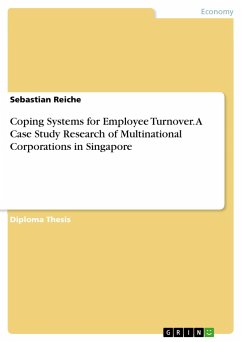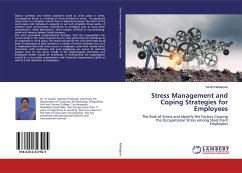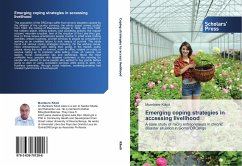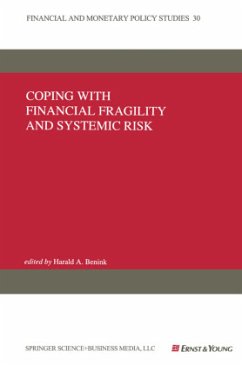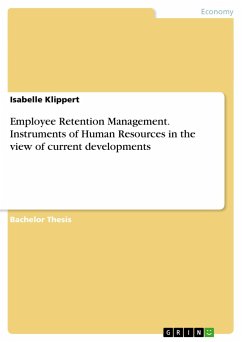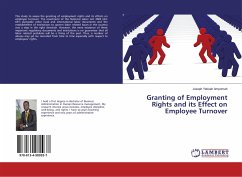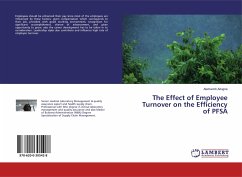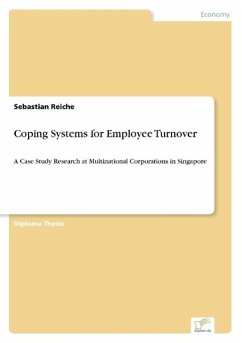
Coping Systems for Employee Turnover
A Case Study Research at Multinational Corporations in Singapore
Versandkostenfrei!
Versandfertig in 1-2 Wochen
48,00 €
inkl. MwSt.

PAYBACK Punkte
0 °P sammeln!
Diploma Thesis from the year 2002 in the subject Business economics - Trade and Distribution, grade: 1,0, University of Hannover (Wirtschaftswissenschaften), language: English, abstract: Inhaltsangabe:Abstract:As business activities become increasingly global and cross-nationally intertwined, human resource management is no longer defined by national boundaries. In particular, multinational corporations (MNCs) face the challenge of managing their globally dispersed work force effectively. Yet, the field of international human resource management (IHRM) remains an understudied domain, lacking s...
Diploma Thesis from the year 2002 in the subject Business economics - Trade and Distribution, grade: 1,0, University of Hannover (Wirtschaftswissenschaften), language: English, abstract: Inhaltsangabe:Abstract:
As business activities become increasingly global and cross-nationally intertwined, human resource management is no longer defined by national boundaries. In particular, multinational corporations (MNCs) face the challenge of managing their globally dispersed work force effectively. Yet, the field of international human resource management (IHRM) remains an understudied domain, lacking substantial empirical and conceptual research. Also, a prevailing focus on quantitative data suggests a need for deeper qualitative investigations, which allows a more profound assessment of the context in which IHRM unfolds.
By addressing IHRM at MNCs, the current empirical work contributes additional scientific insights into this domain. In this respect, the author has selected an approach of inductive comparative case study research, mainly based on qualitative data, that enables the generation of theory through an iterative, data-driven process. This method has been applied to investigate IHRM because it is particularly fruitful when examining new and narrowly developed scientific fields as well as considering contextual conditions.
Thus, a multiple case study was conducted through exploratory and semi-structured interviews with managerial employees at six western MNCs which maintain their regional headquarters for South-East Asia in Singapore. The initial guiding objective was to provide a more thorough understanding of the forces that influence IHRM. Due to the exploratory nature of the research set-up, this broad focus has narrowed during the conduct of the study and the subsequent data analysis. Based on the interviews, employee turnover emerged as a key concern for international organizations operating in Singapore. Although a tight local labour market has led to the effect that job turnover is a widespread phenomenon, there is a lack of research addressing this issue and the resulting implications for foreign MNCs.
The present study s focus on employee turnover also takes into account the growing importance of local staff for MNCs. Indeed, by acknowledging the critical role that local nationals play at the host country level, it will be increasingly imperative for international organizations to establish effective retention strategies. Despite this obvious significance, the field of managing employee turnover also remains considerably underdeveloped.
Building on the results of the conducted multiple case study, the purpose of this work is to fill the described research void and generate well-grounded theory in a process that is twofold. First, the text aims at providing an in-depth analysis of potential determinants of employee turnover at international organizations. In the second step, these factors will serve as a basis for developing effective coping mechanisms in the context of IHRM at MNCs.
Inhaltsverzeichnis:Table of Contents:
TABLE OF CONTENTSI
LIST OF ABBREVIATIONSIV
LIST OF FIGURESV
LIST OF TABLESVI
1.INTRODUCTION1
1.1HUMAN RESOURCE MANAGEMENT IN AN INTERNATIONAL CONTEXT: PURPOSE AND SCOPE OF THIS WORK1
1.2OUTLINE AND STRUCTURE OF THIS WORK3
2.CASE STUDY RESEARCH IN SINGAPORE: NATIONAL CONTEXT, RESEARCH METHODOLOGY AND RESULTS4
2.1RELEVANT FACTORS OF THE SINGAPOREAN CONTEXT4
2.1.1Resource-related Characteristics4
2.1.2Institutional Characteristics6
2.1.3Cultural Characteristics8
2.2THE METHODOLOGICAL FRAMEWORK10
2.2.1Case Study Research as Approach to Qualitative Investigation10
2.2.2The Research Design13
2.2.2.1Purpose and Research Questions of the Study13
2.2.2.2Selected Case Companies15
2.2.2.3Data Collection17
2.3APPROACHING THE CASE DATA: RESUL...
As business activities become increasingly global and cross-nationally intertwined, human resource management is no longer defined by national boundaries. In particular, multinational corporations (MNCs) face the challenge of managing their globally dispersed work force effectively. Yet, the field of international human resource management (IHRM) remains an understudied domain, lacking substantial empirical and conceptual research. Also, a prevailing focus on quantitative data suggests a need for deeper qualitative investigations, which allows a more profound assessment of the context in which IHRM unfolds.
By addressing IHRM at MNCs, the current empirical work contributes additional scientific insights into this domain. In this respect, the author has selected an approach of inductive comparative case study research, mainly based on qualitative data, that enables the generation of theory through an iterative, data-driven process. This method has been applied to investigate IHRM because it is particularly fruitful when examining new and narrowly developed scientific fields as well as considering contextual conditions.
Thus, a multiple case study was conducted through exploratory and semi-structured interviews with managerial employees at six western MNCs which maintain their regional headquarters for South-East Asia in Singapore. The initial guiding objective was to provide a more thorough understanding of the forces that influence IHRM. Due to the exploratory nature of the research set-up, this broad focus has narrowed during the conduct of the study and the subsequent data analysis. Based on the interviews, employee turnover emerged as a key concern for international organizations operating in Singapore. Although a tight local labour market has led to the effect that job turnover is a widespread phenomenon, there is a lack of research addressing this issue and the resulting implications for foreign MNCs.
The present study s focus on employee turnover also takes into account the growing importance of local staff for MNCs. Indeed, by acknowledging the critical role that local nationals play at the host country level, it will be increasingly imperative for international organizations to establish effective retention strategies. Despite this obvious significance, the field of managing employee turnover also remains considerably underdeveloped.
Building on the results of the conducted multiple case study, the purpose of this work is to fill the described research void and generate well-grounded theory in a process that is twofold. First, the text aims at providing an in-depth analysis of potential determinants of employee turnover at international organizations. In the second step, these factors will serve as a basis for developing effective coping mechanisms in the context of IHRM at MNCs.
Inhaltsverzeichnis:Table of Contents:
TABLE OF CONTENTSI
LIST OF ABBREVIATIONSIV
LIST OF FIGURESV
LIST OF TABLESVI
1.INTRODUCTION1
1.1HUMAN RESOURCE MANAGEMENT IN AN INTERNATIONAL CONTEXT: PURPOSE AND SCOPE OF THIS WORK1
1.2OUTLINE AND STRUCTURE OF THIS WORK3
2.CASE STUDY RESEARCH IN SINGAPORE: NATIONAL CONTEXT, RESEARCH METHODOLOGY AND RESULTS4
2.1RELEVANT FACTORS OF THE SINGAPOREAN CONTEXT4
2.1.1Resource-related Characteristics4
2.1.2Institutional Characteristics6
2.1.3Cultural Characteristics8
2.2THE METHODOLOGICAL FRAMEWORK10
2.2.1Case Study Research as Approach to Qualitative Investigation10
2.2.2The Research Design13
2.2.2.1Purpose and Research Questions of the Study13
2.2.2.2Selected Case Companies15
2.2.2.3Data Collection17
2.3APPROACHING THE CASE DATA: RESUL...





